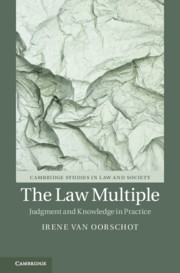Book contents
- The Law Multiple
- Cambridge Studies in Law and Society
- The Law Multiple
- Copyright page
- Dedication
- Contents
- Figures
- Acknowledgments
- Note on the Text
- 1 Troubling Encounters
- 2 Abstractionism, Revisited
- 3 Dealing with Difference
- 4 Situating Remorse
- 5 Visualizing Cases
- 6 Folding Times, Making Truths
- 7 Productive Fictions for the Study of the Law
- Notes
- Works Cited
- Index
- Cambridge Studies in Law and Society
6 - Folding Times, Making Truths
Published online by Cambridge University Press: 18 February 2021
- The Law Multiple
- Cambridge Studies in Law and Society
- The Law Multiple
- Copyright page
- Dedication
- Contents
- Figures
- Acknowledgments
- Note on the Text
- 1 Troubling Encounters
- 2 Abstractionism, Revisited
- 3 Dealing with Difference
- 4 Situating Remorse
- 5 Visualizing Cases
- 6 Folding Times, Making Truths
- 7 Productive Fictions for the Study of the Law
- Notes
- Works Cited
- Index
- Cambridge Studies in Law and Society
Summary
Whereas the preceding chapter has taken the case file as an object immediately present in the here-and-now of ongoing practices, this chapter highlights the case file not as materially but as a temporally recalcitrant object. It traces the case file’s procedural and institutional histories, paying attention in particular to the way these histories are evoked and negotiated in court. I show how the case file becomes implicated in struggles over “what really happened”, and distinguish between two modes in which it does so: on the one hand, the legal case file acts as an innocent transporter of facts and truth; on the other, it becomes visible as an object that has actively transformed and delineated the case in question. I propose the use of the notion of the temporally folded object to understand the specific operations of legal case files, and in so doing contribute to the theorization of legal temporalities more broadly. Methodologically, then, this chapter underscores the necessity to attend to the multiple ways histories and futures become implicated in the production of legal knowledges.
Keywords
- Type
- Chapter
- Information
- The Law MultipleJudgment and Knowledge in Practice, pp. 141 - 166Publisher: Cambridge University PressPrint publication year: 2021

